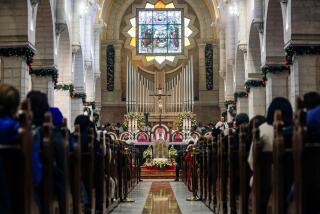Tale of Jesus’ Birth Provides Look at Social Climate of the Times : History: Scholars say Mary and Joseph lived in an oppressive society in which they were heavily taxed.
- Share via
It’s a cold Mediterranean night nearly 2,000 years ago. Joseph and a pregnant Mary are trudging through rough terrain on donkey and foot, making the 100-mile trip from Nazareth to Joseph’s hometown, Bethlehem.
Had it been a voluntary trip, the couple might have chosen to travel in the dry season. But they had no choice.
It was for tax reasons that Mary and Joseph headed to Bethlehem, according to the story of Jesus’ birth in the Gospel of Luke. Far away in Rome, the emperor Caesar Augustus had demanded a census be taken of all his conquered lands so he might know what he would collect in taxes. In those days, taxes were paid in crops and animals.
Mary and Joseph, New Testament scholars say, lived in an oppressive society. They were heavily taxed by local and faraway rulers who, some scholars believe, demanded as much as 50% to 60% of what the common people grew and owned. Unlike the American system, which uses taxes to help the less fortunate, Mary and Joseph’s taxes were used to boost the wealth of rulers.
“Caesar decrees all the world to be taxed,” said Richard Horsley, author of “Liberation of Christmas,” a book about the social and political climate at the time of Jesus’ birth. “So Joseph takes Mary back to Bethlehem. We could reasonably assume that Joseph had been farming there but couldn’t make it. He probably left Bethlehem because of debt and went about 100 miles from his home to find work.”
Caesar was so tax-hungry, Horsley says, that if someone couldn’t pay, the Romans would force the peasants to go back home and farm the land again--even though they left because they couldn’t make it. He suspects that Joseph, cast in biblical literature as a carpenter or woodworker, was actually a “downwardly mobile” peasant who had lost his land.
*
Although some scholars disagree about whether an actual census took place--believing it came years after the birth--they don’t dispute that the peasants at the time Jesus was born lived in an atmosphere of upheaval and social discontent.
When Jesus was born, Herod the Great was king and ruled Judea, Samaria and Galilee as a police state. Herod was known as a “client king,” appointed by Rome to run a huge kingdom of Jews.
Horsley suggests a tense and often confrontational relationship existed between the farmers, fishermen and townspeople of Galilee and Herod, Roman officials and the urban aristocracy, who held all the wealth and power.
“It’s clear that Herod was brutal,” adds Douglas Oakman, a religion professor at Pacific Lutheran University. “Jesus was born into essentially a third-world context under a military dictatorship. It was a society where everyone was coerced.”
As in most agrarian societies, about 10% of the population was born into nobility and lived lavishly. The remaining 90% worked the fields around Nazareth, growing grapes, olives and grain, Horsley said. In Bethlehem, where it is drier, sheep and goats were raised. The people were subsistence farmers, raising one bag of food for themselves and one for Herod or Caesar, Oakman said.
“Some may have been better off than others--and we’re talking about approximately 90% of the Mediterranean population--but most peasants lived a precarious existence,” biblical scholar John Dominic Crossan said in an interview in Christian Century magazine. “I think it’s safe to say that by our standards, injustice was built into this system--10% at the top controlled virtually everything.”
While the rich prospered, the peasants suffered. And their hatred for Herod and the Romans grew.
“The Jews hated him because he had a reputation as a murderer and a thug,” said the Rev. John P. Meier, a biblical scholar and professor of religion at the Catholic University of America. “Certainly there was tension. No one likes to have a murderer living over them or be heavily taxed.”
“The whole concept of civil rights did not exist,” said Meier, author of “A Marginal Jew,” a landmark study of the historical Jesus. “If Herod wanted to do away with you, he could slit the throat of anybody he wanted.”
To understand society at that time, it is necessary to understand the Mediterranean culture, says scholar Bruce J. Malina, a theology professor at Creighton University.
“The main feature of life then was gender separation,” said Malina. “It was a male-female world where they never met each other unless it was in bed.”
The women stayed near the tiny two-room houses, caring for the children, the garden and chickens. They fetched water, cooked in a semipublic courtyard and milked goats, which is what scholars imagine Mary did too. Men worked in the fields, or in the case of Joseph, with their hands, carving stone or building houses.
More to Read
Sign up for Essential California
The most important California stories and recommendations in your inbox every morning.
You may occasionally receive promotional content from the Los Angeles Times.













